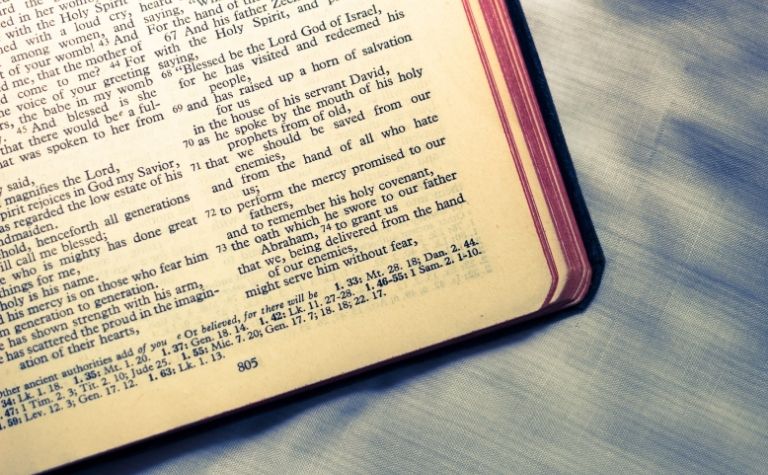The Presbyterian tradition has historically held the Bible in high esteem. Its founder, French Reformer John Calvin (1509-1564), and other pastors and theologians had the conviction that God inspired Scripture and that it was authoritative for the Church.
The King James Version (KJV) is the Bible translation that Presbyterians have used historically. However, in recent decades, many Presbyterians switched to the New Revised Standard Version (NRSV), the English Standard Version (ESV), or the New International Version (NIV) of the Bible.
What Study Bibles do Presbyterians prefer? What do Presbyterians believe about Sola Scriptura and the doctrine of inerrancy? Keep reading to learn more.
Also, see Presbyterian vs. Pentecostal: What’s the Difference? to learn more.

What Are the Best Study Bibles for Presbyterians?
The sheer number of Bible translations and Study Bibles can appear daunting to the average Christian. Moreover, their wide range of theological perspectives can complicate matters further.
Although Presbyterians do not possess their own particular Study Bible, many Bibles reflect the principles of Presbyterian or Reformed theology. Two notable Study Bibles with a Reformed perspective include:
- The Reformation Study Bible: Contributors include R.C. Sproul, Sinclair Ferguson, Wayne Grudem, Knox Chamberlin, Buck Parsons, Stephen Nichols, Steven Lawson, Michael Horton, Robert Yarbrough, Derek Thomas, and T. Desmond Alexander.
- The Spirit of the Reformation Study Bible: Contributors include Richard Pratt, Bruce Waltke, John Frame, Roger Nicole, J.I. Packer, James Montgomery Boice, Sinclair Ferguson, and Wayne Grudem.
R.C. Sproul (1939-2017), the general editor of The Reformation Study Bible, is both Reformed and theologically conservative.
Over the years, this Study Bible has changed names (originally, publishers called it the New Geneva Study Bible) and utilized two different translations (switched from The New King James to the English Standard Version in 2005).
The study notes offer a variety of perspectives in places where there is variance within the Reformed tradition and specificity where there is agreement.
Do Presbyterians Prefer the ESV Translation?
In recent years, there has been a movement within conservative evangelicalism, and especially within the Reformed tradition, to move to use the English Standard Version.
Because of this, the more theologically conservative Presbyterian denominations, such as the Presbyterian Church in America, favor this translation, while the mainline denomination, the Presbyterian Church (USA), does not. (Also see Presbyterian Church USA vs. Presbyterian Church in America: What’s the Difference?)
For the most part, the PCUSA uses the New Revised Standard Version in their publications and liturgy, and local churches in the PCUSA often use this translation as their pew bible.
However, unlike the conservative branches of the reformed tradition, the PCUSA does not have a Study Bible that it can call its own.
However, many Study Bibles align with the PCUSA theologically, including both The HarperCollins Study Bible and The New Oxford Annotated Bible. These Bibles utilize the NRSV and are denominational. Because of this, Protestant and Catholic laypeople and scholars are these Bibles.
Also, both Bibles approach Scripture from a scholarly perspective rather than a theological or devotional viewpoint. However, because of the diversity of thought within the PCUSA, these Bibles do not necessarily represent how a pastor or congregant approaches Scripture. [1] [2] (Also see Presbyterian vs Episcopalian: What’s the Difference?)

Do Presbyterians Believe in Sola Scriptura?
Since the Protestant Reformation, Sola Scriptura has been a cornerstone of Presbyterian and Reformed theology. Sola Scriptura is one of the five “Solas” of the Reformation and means that the Bible is and should be the highest authority in a Christian’s life. (Also see: Presbyterian vs. Methodist: What’s the Difference?)
The words of the Bible contain everything a believer needs for salvation and the Christian life. Sproul explains, “The idea of sola Scriptura is that there is only one written source of divine revelation, which can never be placed on a parallel status with confessional statements, creeds, or the traditions of the church. Scripture alone has the authority to bind the conscience precisely because only Scripture is the written revelation of almighty God.” (Twilight of the Idols, Tabletalk, June 2008, p. 7)
Martin Luther and John Calvin argued that reason and tradition could be helpful in the believer’s life but that, ultimately, both must submit to the authority of Scripture. A key component of Sola Scriptura is that the Bible is clear enough for the average person to understand and interpret the primary truths therein.
Accordingly, Protestant reformers were especially concerned with ensuring that every person had access to the Bible in their language. [3]
Throughout its history, Presbyterianism has been committed to the principle of Sola Scriptura. To ensure that the church does not drift away from the truths of Scripture, Presbyterians utilize various creeds or confessions, most notably the Westminster Confession of Faith. (Also see Presbyterian vs. Baptist: What’s the Difference?)
A typical Presbyterian worship service includes both Bible readings and doctrine recitation. Regarding personal study, reading the Bible is essential to Presbyterian life.
Some Presbyterians consider it the most important thing a Christian can do because they believe the Bible should intimately inform how believers live their lives, even if it contradicts culture, experience, or reason.
Presbyterians also often interpret Scripture through a gospel-centered lens. Scholars of this persuasion view the Bible as one unified story, often retroactively interpreting the Old Testament through the perspective of the cross.
Over the last several decades, a rift has occurred in Presbyterian theology between traditional, orthodox teaching and more progressive interpretation of important Christian doctrines.
Thus, within the PCUSA, the largest Presbyterian denomination, a range of views exists concerning how much authority the Bible has for a Christian’s life.
Some Presbyterian scholars have begun to value reason, experience, and tradition more highly than other Presbyterians have in the past. The discussion often goes like this: should reason, tradition or any other factor ever override the clear message of a passage of Scripture? (Also see the full article Do Presbyterians Believe in the Trinity?)

Do Presbyterians Believe the Bible Is Inerrant?
Tied to this issue of scriptural authority is that of inerrancy. One primary reason that some scholars argue for a more moderate view of the Bible’s authority is that they believe that the Bible contains errors.
Like the subject of Sola Scriptura, this issue often divides along the liberal/conservative theological divide, with Presbyterians taking one side or the other. (Also see Are Calvinists and Presbyterians the Same?)
Generally speaking, the Presbyterian Church in America and the Evangelical Presbyterian Church believe Scripture to be inerrant. At the same time, those in the PCUSA tend to avoid this sort of language when talking about the Bible.
Something that makes this conversation more complex is the variety of meanings connected to the concept of inerrancy. Some theologians believe the Bible to be inerrant in purpose, while others believe that Scripture is inerrant in every statement and detail. (Also see How Do Presbyterians Baptize Adults?)
In addition, some argue that inerrancy is a relatively modern term unique to evangelicalism. In response, some contend that Martin Luther, John Calvin, and most reformers speak of the authority of the Bible in a manner much closer to ideals of theological conservatism than theological liberalism.
Regardless, Presbyterianism has held the Bible in very high regard for the vast majority of its existence. Serious challenges to its importance within Presbyterian circles have only come within the latter half of the twentieth century. (Also see Presbyterian vs. Episcopalian: What’s the Difference?)
References:
[1] Source
[2] Source
[3] Source
Related Questions
The Presbyterian and Episcopalian traditions are Protestant branches of the Christian faith that originated in 16th-century Europe. These denominations have much in common, especially when contrasted...
The Roman Catholic and Presbyterian branches of the Christian faith trace their origins to Jesus of Nazareth and his apostles, as well as their writings that comprise most of the New Testament. There...
